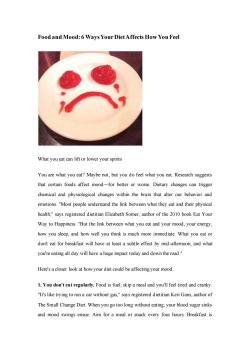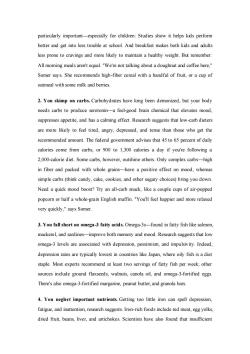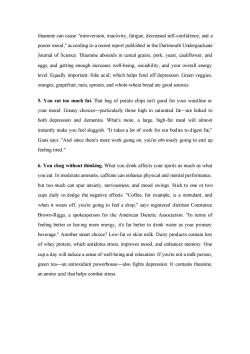《新编大学英语》综合教程(第三版第二册)B2U6_Self-market_Reading Material_Food and Mood

Food and Mood:6 Ways Your Diet Affects How You Feel What you eat can lift or lower your spirits You are what you eat?Maybe not,but you do feel what you eat.Research suggests that certain foods affect mood-for better or worse.Dietary changes can trigger chemical and physiological changes within the brain that alter our behavior and emotions."Most people understand the link between what they eat and their physical health,"says registered dietitian Elizabeth Somer,author of the 2010 book Eat Your Way to Happiness."But the link between what you eat and your mood,your energy, how you sleep,and how well you think is much more immediate.What you eat or don't eat for breakfast will have at least a subtle effect by mid-afternoon,and what you're eating all day will have a huge impact today and down the road." Here's a closer look at how your diet could be affecting your mood. 1.You don't eat regularly.Food is fuel;skip a meal and you'll feel tired and cranky. "It's like trying to run a car without gas,"says registered dietitian Keri Gans,author of The Small Change Diet.When you go too long without eating,your blood sugar sinks and mood swings ensue.Aim for a meal or snack every four hours.Breakfast is
Food and Mood: 6 Ways Your Diet Affects How You Feel What you eat can lift or lower your spirits You are what you eat? Maybe not, but you do feel what you eat. Research suggests that certain foods affect mood—for better or worse. Dietary changes can trigger chemical and physiological changes within the brain that alter our behavior and emotions. "Most people understand the link between what they eat and their physical health," says registered dietitian Elizabeth Somer, author of the 2010 book Eat Your Way to Happiness. "But the link between what you eat and your mood, your energy, how you sleep, and how well you think is much more immediate. What you eat or don't eat for breakfast will have at least a subtle effect by mid-afternoon, and what you're eating all day will have a huge impact today and down the road." Here's a closer look at how your diet could be affecting your mood. 1. You don't eat regularly. Food is fuel; skip a meal and you'll feel tired and cranky. "It's like trying to run a car without gas," says registered dietitian Keri Gans, author of The Small Change Diet. When you go too long without eating, your blood sugar sinks and mood swings ensue. Aim for a meal or snack every four hours. Breakfast is

particularly important-especially for children:Studies show it helps kids perform better and get into less trouble at school.And breakfast makes both kids and adults less prone to cravings and more likely to maintain a healthy weight.But remember: All morning meals aren't equal."We're not talking about a doughnut and coffee here," Somer says.She recommends high-fiber cereal with a handful of fruit,or a cup of oatmeal with some milk and berries. 2.You skimp on carbs.Carbohydrates have long been demonized,but your body needs carbs to produce serotonin-a feel-good brain chemical that elevates mood, suppresses appetite,and has a calming effect.Research suggests that low-carb dieters are more likely to feel tired,angry,depressed,and tense than those who get the recommended amount.The federal government advises that 45 to 65 percent of daily calories come from carbs,or 900 to 1,300 calories a day if you're following a 2,000-calorie diet.Some carbs,however,outshine others.Only complex carbs-high in fiber and packed with whole grains-have a positive effect on mood,whereas simple carbs(think candy,cake,cookies,and other sugary choices)bring you down. Need a quick mood boost?Try an all-carb snack,like a couple cups of air-popped popcorn or half a whole-grain English muffin."You'll feel happier and more relaxed very quickly,"says Somer. 3.You fall short on omega-3 fatty acids.Omega-3s-found in fatty fish like salmon, mackerel,and sard ines-improve both memory and mood.Research suggests that low omega-3 levels are associated with depression,pessimism,and impulsivity.Indeed, depression rates are typically lowest in countries like Japan,where oily fish is a diet staple.Most experts recommend at least two servings of fatty fish per week;other sources include ground flaxseeds,walnuts,canola oil,and omega-3-fortified eggs. There's also omega-3-fortified margarine,peanut butter,and granola bars. 4.You neglect important nutrients.Getting too little iron can spell depression, fatigue,and inattention,research suggests.Iron-rich foods include red meat,egg yolks, dried fruit,beans,liver,and artichokes.Scientists have also found that insufficient
particularly important—especially for children: Studies show it helps kids perform better and get into less trouble at school. And breakfast makes both kids and adults less prone to cravings and more likely to maintain a healthy weight. But remember: All morning meals aren't equal. "We're not talking about a doughnut and coffee here," Somer says. She recommends high-fiber cereal with a handful of fruit, or a cup of oatmeal with some milk and berries. 2. You skimp on carbs. Carbohydrates have long been demonized, but your body needs carbs to produce serotonin—a feel-good brain chemical that elevates mood, suppresses appetite, and has a calming effect. Research suggests that low-carb dieters are more likely to feel tired, angry, depressed, and tense than those who get the recommended amount. The federal government advises that 45 to 65 percent of daily calories come from carbs, or 900 to 1,300 calories a day if you're following a 2,000-calorie diet. Some carbs, however, outshine others. Only complex carbs—high in fiber and packed with whole grains—have a positive effect on mood, whereas simple carbs (think candy, cake, cookies, and other sugary choices) bring you down. Need a quick mood boost? Try an all-carb snack, like a couple cups of air-popped popcorn or half a whole-grain English muffin. "You'll feel happier and more relaxed very quickly," says Somer. 3. You fall short on omega-3 fatty acids. Omega-3s—found in fatty fish like salmon, mackerel, and sardines—improve both memory and mood. Research suggests that low omega-3 levels are associated with depression, pessimism, and impulsivity. Indeed, depression rates are typically lowest in countries like Japan, where oily fish is a diet staple. Most experts recommend at least two servings of fatty fish per week; other sources include ground flaxseeds, walnuts, canola oil, and omega-3-fortified eggs. There's also omega-3-fortified margarine, peanut butter, and granola bars. 4. You neglect important nutrients. Getting too little iron can spell depression, fatigue, and inattention, research suggests. Iron-rich foods include red meat, egg yolks, dried fruit, beans, liver, and artichokes. Scientists have also found that insufficient

thiamine can cause "introversion,inactivity,fatigue,decreased self-confidence,and a poorer mood,"according to a recent report published in the Dartmouth Undergraduate Journal of Science.Thiamine abounds in cereal grains,pork,yeast,cauliflower,and eggs,and getting enough increases well-being,sociability,and your overall energy level.Equally important:folic acid,which helps fend off depression.Green veggies, oranges,grapefruit,nuts,sprouts,and whole-wheat bread are good sources 5.You eat too much fat.That bag of potato chips isn't good for your waistline or your mood.Greasy choices-particularly those high in saturated fat-are linked to both depression and dementia.What's more,a large,high-fat meal will almost instantly make you feel sluggish."It takes a lot of work for our bodies to digest fat," Gans says."And since there's more work going on,you're obviously going to end up feeling tired." 6.You chug without thinking.What you drink affects your spirits as much as what you eat.In moderate amounts,caffeine can enhance physical and mental performance, but too much can spur anxiety,nervousness,and mood swings.Stick to one or two cups daily to dodge the negative effects."Coffee,for example,is a stimulant,and when it wears off,you're going to feel a drop,"says registered dietitian Constance Brown-Riggs,a spokesperson for the American Dietetic Association."In terms of feeling better or having more energy,it's far better to drink water as your primary beverage."Another smart choice?Low-fat or skim milk.Dairy products contain lots of whey protein,which antidotes stress,improves mood,and enhances memory.One cup a day will induce a sense of well-being and relaxation.If you're not a milk person, green tea-an antioxidant powerhouse-also fights depression.It contains theanine, an amino acid that helps combat stress
thiamine can cause "introversion, inactivity, fatigue, decreased self-confidence, and a poorer mood," according to a recent report published in the Dartmouth Undergraduate Journal of Science. Thiamine abounds in cereal grains, pork, yeast, cauliflower, and eggs, and getting enough increases well-being, sociability, and your overall energy level. Equally important: folic acid, which helps fend off depression. Green veggies, oranges, grapefruit, nuts, sprouts, and whole-wheat bread are good sources. 5. You eat too much fat. That bag of potato chips isn't good for your waistline or your mood. Greasy choices—particularly those high in saturated fat—are linked to both depression and dementia. What's more, a large, high-fat meal will almost instantly make you feel sluggish. "It takes a lot of work for our bodies to digest fat," Gans says. "And since there's more work going on, you're obviously going to end up feeling tired." 6. You chug without thinking. What you drink affects your spirits as much as what you eat. In moderate amounts, caffeine can enhance physical and mental performance, but too much can spur anxiety, nervousness, and mood swings. Stick to one or two cups daily to dodge the negative effects. "Coffee, for example, is a stimulant, and when it wears off, you're going to feel a drop," says registered dietitian Constance Brown-Riggs, a spokesperson for the American Dietetic Association. "In terms of feeling better or having more energy, it's far better to drink water as your primary beverage." Another smart choice? Low-fat or skim milk. Dairy products contain lots of whey protein, which antidotes stress, improves mood, and enhances memory. One cup a day will induce a sense of well-being and relaxation. If you're not a milk person, green tea—an antioxidant powerhouse—also fights depression. It contains theanine, an amino acid that helps combat stress
按次数下载不扣除下载券;
注册用户24小时内重复下载只扣除一次;
顺序:VIP每日次数-->可用次数-->下载券;
- 《新编大学英语》综合教程(第三版第二册)B2U6_Self-market_Listening Material_Transcript.docx
- 《新编大学英语》综合教程(第三版第二册)B2U6_Self-market_06 B2U06 QUIZ.doc
- 《新编大学英语》综合教程(第三版第二册)B2U6 Translation & Writing.ppt
- 《新编大学英语》综合教程(第三版第二册)B2U6 Read by critical thinking.ppt
- 《新编大学英语》综合教程(第三版第二册)B2U6 Menu.ppt
- 《新编大学英语》综合教程(第三版第二册)B2U6 Activate.ppt
- 《新编大学英语》综合教程(第三版第二册)B2U5_Self-market_Writing Material_推展段落方法之——叙述法.docx
- 《新编大学英语》综合教程(第三版第二册)B2U5_Self-market_Sample.docx
- 《新编大学英语》综合教程(第三版第二册)B2U5_Self-market_Reading Material_盲人的梦境里有画面吗.docx
- 《新编大学英语》综合教程(第三版第二册)B2U5_Self-market_Reading Material_梦是黑白的还是彩色的.docx
- 《新编大学英语》综合教程(第三版第二册)B2U5_Self-market_Reading Material_关于梦境:十个你可能不知道的真相.docx
- 《新编大学英语》综合教程(第三版第二册)B2U5_Self-market_Reading Material_Meanings in Dreams.docx
- 《新编大学英语》综合教程(第三版第二册)B2U5_Self-market_Listening Material_Transcript.docx
- 《新编大学英语》综合教程(第三版第二册)B2U5_Self-market_06 B2U05 QUIZ.doc
- 《新编大学英语》综合教程(第三版第二册)B2U5 Translation & Writing.ppt
- 《新编大学英语》综合教程(第三版第二册)B2U5 Read by critical thinking.ppt
- 《新编大学英语》综合教程(第三版第二册)B2U5 Menu.ppt
- 《新编大学英语》综合教程(第三版第二册)B2U5 Activate.ppt
- 《新编大学英语》综合教程(第三版第二册)B2U4_Spellbound.docx
- 《新编大学英语》综合教程(第三版第二册)B2U4_Self-market_Writing Material_推展段落方法之——举例法.docx
- 《新编大学英语》综合教程(第三版第二册)B2U6_Self-market_Reading Material_Is chocolate really good for me.docx
- 《新编大学英语》综合教程(第三版第二册)B2U6_Self-market_Reading Material_每天吃相同的食物会影响健康吗.docx
- 《新编大学英语》综合教程(第三版第二册)B2U6_Self-market_Samples.docx
- 《新编大学英语》综合教程(第三版第二册)B2U6_Self-market_Writing Material_推展段落方法之——比较与对比法.docx
- 《新编大学英语》综合教程(第三版第二册)B2U6_料理鼠王transcript.docx
- 《新编大学英语》综合教程(第三版第二册)B2U4_Self-market_06 B2U04 QUIZ_B2U4 Oral Quiz.ppt
- 《新编大学英语》综合教程(第三版第二册)B2U3_Self-market_B2U03 QUIZ_06 B2U3 Quiz.doc
- 《新编大学英语》综合教程(第三版第二册)B2U3_Self-market_B2U03 QUIZ_B2U3 Oral Quiz.ppt
- 《新编大学英语》综合教程(第三版第二册)B2U5_Self-market_B2U05 QUIZ_B2U5 Oral Quiz.ppt
- 《新编大学英语》综合教程(第三版第二册)B2U6_Self-market_B2U06 QUIZ_B2U6 Oral Quiz.ppt
- 《新编大学英语》综合教程(第三版第二册)B2U2_Self-market_B2U2 Grammar and Vocabulary.doc
- 《新编大学英语》综合教程(第三版第二册)B2U2_Self-market_B2U2 Oral Quiz.ppt
- 《新编大学英语》综合教程(第三版第二册)B2U2_Self-market_B2U2 Oral Quiz_06 B2U02 QUIZ.docx
- 《新编大学英语》综合教程(第三版第二册)B2U3_Self-market_B2U3 Grammar and Vocabulary.doc
- 《新编大学英语》综合教程(第三版第二册)B2U4_Self-market_B2U4 Grammar and Vocabulary.doc
- 《新编大学英语》综合教程(第三版第二册)B2U5_Self-market_B2U5 Grammar and Vocabulary.doc
- 《新编大学英语》综合教程(第三版第二册)B2U6_Self-market_B2U6 Grammar and Vocabulary.doc
- 《新编大学英语》综合教程(第三版第二册)B2U2_Self-market_Reading Material_B2U2 课文背景材料.docx
- 《新编大学英语》综合教程(第三版第二册)B2U2_Self-market_Reading Material_B2U2课文翻译及课后练习答案.doc
- 《新编大学英语》综合教程(第三版第二册)B2U3_Self-market_Reading Material_B2U3课文翻译及课后练习答案.doc
